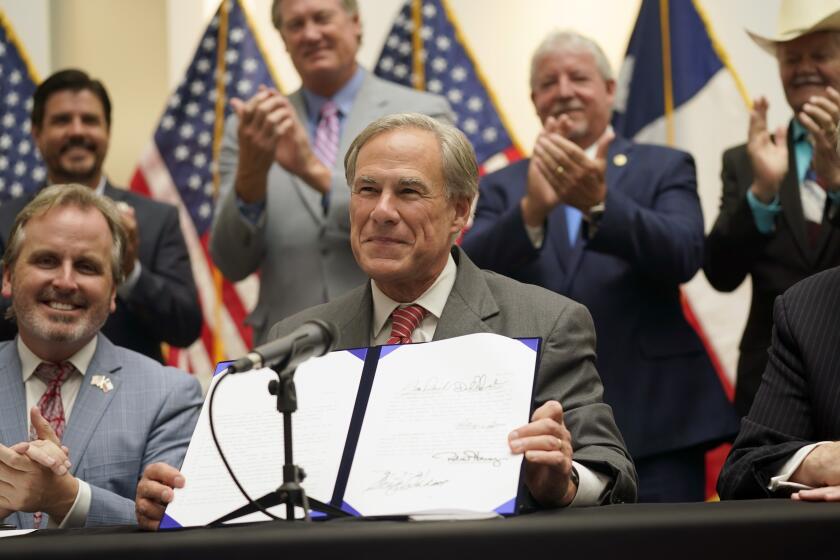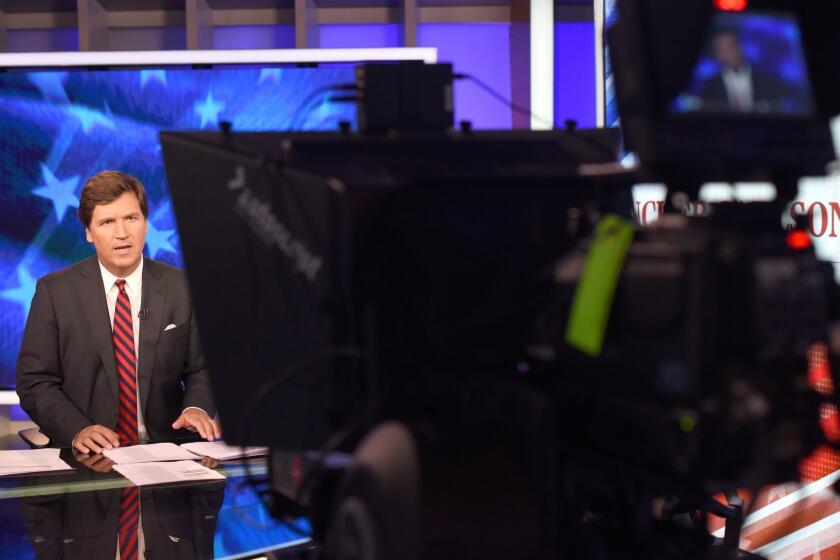Column: Right-wing hatemongers count on the cowardice of companies such as Target

- Share via
If there’s a company in America you’d expect to have the gumption and spirit to see off a stupid and specious attack on the selling of LGBTQ+-themed merchandise for Pride Month in June, it would be Target.
After all, the Minneapolis company is one of America’s biggest retailers, racking up more than $100 billion a year in sales. Only two weeks ago, its chief executive, Brian Cornell, was boasting that “our long-standing commitment to diversity, and equity, and inclusion ... has fueled much of our growth over the last nine years.”
Yet when the braying mob of anti-LGBTQ+ reactionaries targeted Target, the company folded like a cheap, off-the-rack suit. It told personnel in many stores to shrink or even eliminate their Pride-themed merchandise displays or move them to less conspicuous sections of the stores. Some LGBTQ+ designers say their products have been taken off the shelves.
Get the latest from Michael Hiltzik
Commentary on economics and more from a Pulitzer Prize winner.
You may occasionally receive promotional content from the Los Angeles Times.
Target explained its reaction by citing physical threats to its store workers from anti-LGBTQ+ militants. But something more is going on here, and Target’s response doesn’t show the company in a good light.
The context is a concerted effort from the right wing to demonize the LGBTQ+ movement and thereby make any outreach or even acknowledgment of this community toxic for consumer businesses. The goal is to disappear these people and their advocates, reversing a decades-long trend toward acceptance, equity and inclusion.
“Our long-standing commitment to diversity, and equity, and inclusion...has fueled much of our growth over the last nine years.”
— Target CEO Brian Cornell, just before the company downplayed its merchandising of Pride-themed goods
The attacks take many forms, all of them chiefly employed by Republicans and their right-wing acolytes and all of them equally factitious.
Sometimes LGBTQ+ people are accused of being pedophiles who “groom” children for abuse. Sometimes the anti-queer movement is cast as an arm of the right’s attack on “wokeness,” which is just another way of promoting the idea that only straight white males count in this U.S. of A.
Anti-”wokeness” is the chief theme of Florida Gov. Ron DeSantis’ presidential ambition tour. As is well known, DeSantis has been on the warpath with Walt Disney Co., one of his state’s leading employers and economic engines, over the company’s public criticism of his so-called “Don’t Say Gay” law, which suppresses classroom references to gender identity.
(During his glitch-beleaguered May 24 presidential campaign launch on Twitter, DeSantis ludicrously accused Disney of “trying to inject matters of sex into the programming for the youth.”)
There’s no evidence that anti-queer militants constitute anything but a tiny minority of the American public. When they act in concert and their efforts are fueled by social media, however, they can appear to be weightier than they are.
That’s probably what accounted for the pusillanimous reaction of Anheuser-Busch to a right-wing, social-media-driven campaign against its Bud Light beer, after the company’s marketing department launched a publicity campaign with transgender influencer Dylan Mulvaney.
Corporate America has been almost silent on a Texas law that bans most abortions and promotes vigilantism. That’s no surprise when its own interests are at stake.
Anheuser-Busch not only issued a wan statement of regret for the marketing outreach but also sidelined the two marketing executives responsible for the campaign. Given that their assignment had been to revive the brand’s fading popularity, Anheuser-Busch’s effective demotion of the executives signaled to the boycotters that their voices had been heard. That wasn’t a positive corporate message, to say the least.
Anheuser-Busch stock has fallen about 20% in the last two months, while the boycott has been in full cry. Target shares have fallen by about the same percentage since mid-May.
To some extent, it’s unfair to blame the far right for launching boycotts against brands they choose not to like. I’ve defended consumer boycotts in the past, in principle. But all boycotts are not created equal.
There’s a qualitative difference between those directed at noxious behavior, such as the open racism of Tucker Carlson or the bloodlust of the National Rifle Assn., and those directed at efforts to promote tolerance and equality. One knows boycotters by their boycottees.
That brings us back to the companies’ hasty responses. These have been widely misjudged. Alex Shepherd of the New Republic cursed “total, preemptive capitulation” by Anheuser-Bush and Target to the anti-LGBTQ+ boycotts as “profoundly un-American.”
If only they were. Corporate America’s response to even a hint of controversy, no matter how specious the boycotters’ objections, is as American as apple pie. As we’ve seen time and time again, consumer companies are notable not for their steadfastness in defending the public interest, but their cravenness. That’s especially so when, as is the case with the Bud Light and Target campaigns, the context is overtly partisan.
Remember all the companies that pledged to cease or at least suspend campaign contributions to the 147 Republican representatives and senators who voted to overturn the 2020 presidential election? Many, if not most, have gone back on their promise.
Among them, according to ProPublica, are Home Depot, which by the end of 2022 had donated to 65 of the election deniers, and Boeing, which funded at least 74. Toyota, to give it begrudging credit, was at least candid about the thought process involved in resuming contributions to supporters of the Jan. 6, 2021, insurrection: It selected politicians that could carry its water in Washington.
A couple of days ago, the Red Lobster restaurant chain announced that it was bailing out on Tucker Carlson’s Fox News TV show, becoming at least the 20th advertiser to pull the plug.
“Toyota supports candidates based on their position on issues that are important to the auto industry and the company,” the company told me in June 2021. “We do not believe it is appropriate to judge members of Congress solely based on their votes on the electoral certification.” To put it another way, “money talks, democratic principle walks.”
Many corporations will say for the record that they believe in women’s healthcare rights. But when a horrifically punitive antiabortion law went into effect in Texas in 2021, the silence from the corporate community was deafening. It still is; not a peep of protest has come from Texas-based big businesses such as American Airlines, Texas Instruments, Dell and Hewlett Packard Enterprise — even though the law is certain to make recruiting women for important jobs harder for them.
One problem in assessing the campaigns against Bud Light and Target is a lack of clarity about their results. It’s hard to be sure whether Bud Light’s continuing sales slump is due to the anti-woke publicity or to the fact that, not to be indelicate, the product tastes like it’s been strained through a horse.
Target muddied the waters in its own case by explaining that it minimized the displays of Pride-themed merchandise to protect its employees from violence.
There are, of course, other ways to achieve that end, including by stepping up security in vulnerable stores and making clear that it will prosecute the hell out of anyone who commits or threatens to commit an assault on its premises.
Target has also let it be known that the merchandise it removed from inventory was from a single British designer whose work has exploited satanic imagery. The company’s website, anyway, is replete with Pride-themed goods.
One would hope that companies that become objects of ideologically inspired campaigns like these don’t think they can mollify the torch-bearing mob. If they think they can immunize themselves, they can take a lesson from the experience of Chick-fil-A.
The fast-food chain became the target of localized boycotts in 2012, when CEO Dan Cathy publicly voiced the conviction that gay marriage violated God’s plan.
Progressive politicians in Boston, Philadelphia and Chicago, among other places, threatened to ban Chick-fil-A stores from their jurisdictions. Calls for boycotts erupted on Facebook and Twitter. The company issued a statement disavowing Cathy’s viewpoint as a matter of corporate policy. A sort of reverse boycott occurred, in the form of a one-day eat-in by company fans at Chick-fil-A stores.
But the political environment has changed. Recently it became known that Chick-fil-A had appointed a vice president for diversity, equity and inclusion — in 2021. (Moreover, the VP is Black.) The discovery has inspired a new campaign for a boycott, this time from the right wing. One acolyte of Donald Trump tweeted, “Disappointing. Et tu Chik-fil-A?”
More to Read
Inside the business of entertainment
The Wide Shot brings you news, analysis and insights on everything from streaming wars to production — and what it all means for the future.
You may occasionally receive promotional content from the Los Angeles Times.













